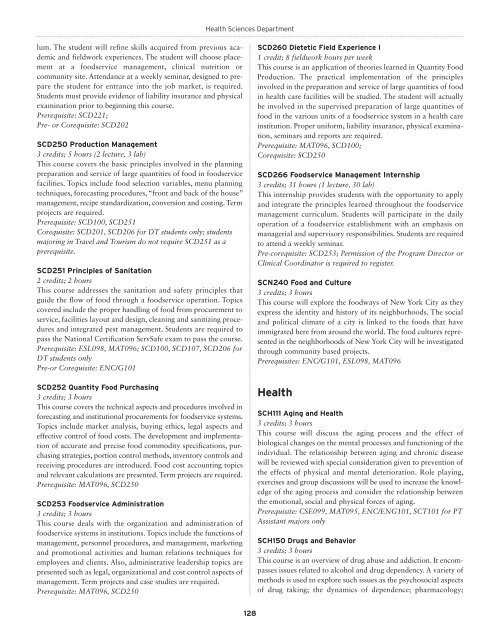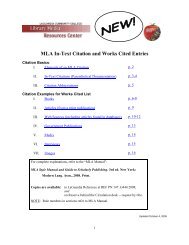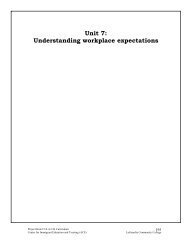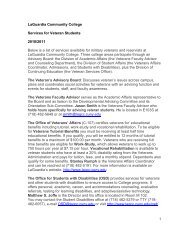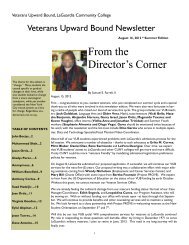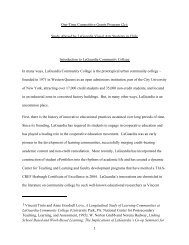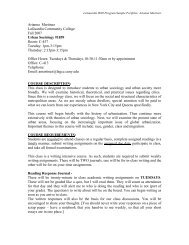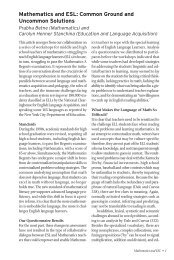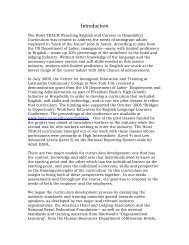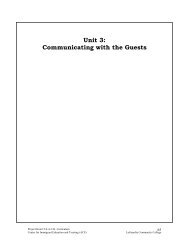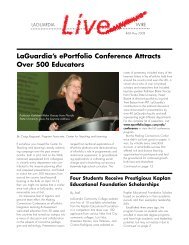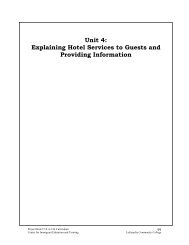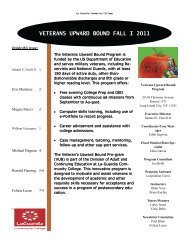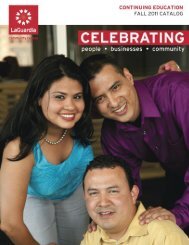COURSE INDEX - LaGuardia Community College
COURSE INDEX - LaGuardia Community College
COURSE INDEX - LaGuardia Community College
Create successful ePaper yourself
Turn your PDF publications into a flip-book with our unique Google optimized e-Paper software.
Health Sciences Department<br />
lum. The student will refine skills acquired from previous academic<br />
and fieldwork experiences. The student will choose placement<br />
at a foodservice management, clinical nutrition or<br />
community site. Attendance at a weekly seminar, designed to prepare<br />
the student for entrance into the job market, is required.<br />
Students must provide evidence of liability insurance and physical<br />
examination prior to beginning this course.<br />
Prerequisite: SCD221;<br />
Pre- or Corequisite: SCD202<br />
SCD250 Production Management<br />
3 credits; 5 hours (2 lecture, 3 lab)<br />
This course covers the basic principles involved in the planning<br />
preparation and service of large quantities of food in foodservice<br />
facilities. Topics include food selection variables, menu planning<br />
techniques, forecasting procedures, “front and back of the house”<br />
management, recipe standardization, conversion and costing. Term<br />
projects are required.<br />
Prerequisite: SCD100, SCD251<br />
Corequisite: SCD201, SCD206 for DT students only; students<br />
majoring in Travel and Tourism do not require SCD251 as a<br />
prerequisite.<br />
SCD251 Principles of Sanitation<br />
2 credits; 2 hours<br />
This course addresses the sanitation and safety principles that<br />
guide the flow of food through a foodservice operation. Topics<br />
covered include the proper handling of food from procurement to<br />
service, facilities layout and design, cleaning and sanitizing procedures<br />
and integrated pest management. Students are required to<br />
pass the National Certification ServSafe exam to pass the course.<br />
Prerequisite: ESL098, MAT096; SCD100, SCD107, SCD206 for<br />
DT students only<br />
Pre-or Corequisite: ENC/G101<br />
SCD252 Quantity Food Purchasing<br />
3 credits; 3 hours<br />
This course covers the technical aspects and procedures involved in<br />
forecasting and institutional procurements for foodservice systems.<br />
Topics include market analysis, buying ethics, legal aspects and<br />
effective control of food costs. The development and implementation<br />
of accurate and precise food commodity specifications, purchasing<br />
strategies, portion control methods, inventory controls and<br />
receiving procedures are introduced. Food cost accounting topics<br />
and relevant calculations are presented. Term projects are required.<br />
Prerequisite: MAT096, SCD250<br />
SCD253 Foodservice Administration<br />
3 credits; 3 hours<br />
This course deals with the organization and administration of<br />
foodservice systems in institutions. Topics include the functions of<br />
management, personnel procedures, and management, marketing<br />
and promotional activities and human relations techniques for<br />
employees and clients. Also, administrative leadership topics are<br />
presented such as legal, organizational and cost control aspects of<br />
management. Term projects and case studies are required.<br />
Prerequisite: MAT096, SCD250<br />
SCD260 Dietetic Field Experience I<br />
1 credit; 8 fieldwork hours per week<br />
This course is an application of theories learned in Quantity Food<br />
Production. The practical implementation of the principles<br />
involved in the preparation and service of large quantities of food<br />
in health care facilities will be studied. The student will actually<br />
be involved in the supervised preparation of large quantities of<br />
food in the various units of a foodservice system in a health care<br />
institution. Proper uniform, liability insurance, physical examination,<br />
seminars and reports are required.<br />
Prerequisite: MAT096, SCD100;<br />
Corequisite: SCD250<br />
SCD266 Foodservice Management Internship<br />
3 credits; 31 hours (1 lecture, 30 lab)<br />
This internship provides students with the opportunity to apply<br />
and integrate the principles learned throughout the foodservice<br />
management curriculum. Students will participate in the daily<br />
operation of a foodservice establishment with an emphasis on<br />
managerial and supervisory responsibilities. Students are required<br />
to attend a weekly seminar.<br />
Pre-corequisite: SCD253; Permission of the Program Director or<br />
Clinical Coordinator is required to register.<br />
SCN240 Food and Culture<br />
3 credits; 3 hours<br />
This course will explore the foodways of New York City as they<br />
express the identity and history of its neighborhoods. The social<br />
and political climate of a city is linked to the foods that have<br />
immigrated here from around the world. The food cultures represented<br />
in the neighborhoods of New York City will be investigated<br />
through community based projects.<br />
Prerequisites: ENC/G101, ESL098, MAT096<br />
Health<br />
SCH111 Aging and Health<br />
3 credits; 3 hours<br />
This course will discuss the aging process and the effect of<br />
biological changes on the mental processes and functioning of the<br />
individual. The relationship between aging and chronic disease<br />
will be reviewed with special consideration given to prevention of<br />
the effects of physical and mental deterioration. Role playing,<br />
exercises and group discussions will be used to increase the knowledge<br />
of the aging process and consider the relationship between<br />
the emotional, social and physical forces of aging.<br />
Prerequisite: CSE099, MAT095, ENC/ENG101, SCT101 for PT<br />
Assistant majors only<br />
SCH150 Drugs and Behavior<br />
3 credits; 3 hours<br />
This course is an overview of drug abuse and addiction. It encompasses<br />
issues related to alcohol and drug dependency. A variety of<br />
methods is used to explore such issues as the psychosocial aspects<br />
of drug taking; the dynamics of dependence; pharmacology;<br />
128


